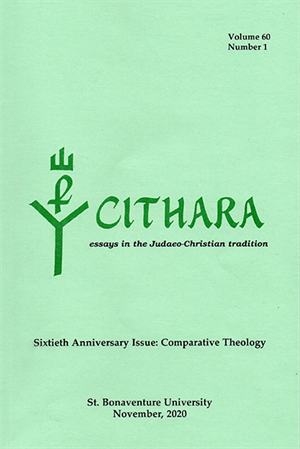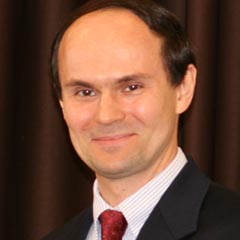Feb 23, 2021

The latest issue of St. Bonaventure University’s peer-reviewed journal Cithara marks a publication milestone with a focus on comparative theology.
As Cithara celebrates its 60th anniversary issue, two of the journal’s editors shared their pride for the academic journal’s longevity and dedication to the liberal arts.
“Cithara has lasted as long as it has because it publishes articles of broad cultural interest and because we meet the interest of our audience,” said Dr. John Mulryan, professor emeritus of English at St. Bonaventure who was Cithara’s editor for 30 years. Mulryan retired from full-time teaching in 2011 after 45 years of service. He stepped down as editor of Cithara in 2010. Dr. Oleg Bychkov, professor of theology at the university, has been the publication’s editor for the past decade.
Cithara, which features peer-reviewed essays in the Judaeo-Christian tradition, publishes essays and book reviews relating to the problems of human beings in the light of their heritage and of their future. The journal is published twice a year and its subscribers include individuals and libraries. It is also distributed digitally by ProQuest and ATLA (American Theological Libraries Association), among other databases.
 According to a talk delivered by writer Howard R. Wolf at the 50th anniversary celebration of Cithara, not many academic journals survive for 50 years.
According to a talk delivered by writer Howard R. Wolf at the 50th anniversary celebration of Cithara, not many academic journals survive for 50 years.
Mulryan said the editors and advisory board have “worked very hard to produce great issues every time we went to press. Featuring sophisticated and great writing, we always published articles that were of high quality and general cultural interest and that way we maintained a broad base of readers.”
Bychkov said Thomas Merton was one of the first contributors to the journal, and Cithara regularly publishes articles and book reviews about the Trappist monk and theologian who once taught at St. Bonaventure.
The first article in the 60th anniversary issue released in January is an introduction to the edition’s topic of comparative theology, or interreligious dialogue. Author R. Trent Pomplun notes that while comparative theology has boomed in recent years, the foundation of learning from one or more other traditions has been “part and parcel of most religious traditions.”
Additional articles in the edition include “Dharmakīrti and the Theologians: Pratyabhijñā Śaivism and Christian Theological Reading” by Matthew Z. Vale of the University of Notre Dame, “Avicenna and Medieval Franciscans on the Philosophical Foundations of Beauty” by Hadi Rabiei of the University of Art, Tehran, “Voltaire and the Jews’ Promised Land” by Arthur Scherr of the City University of New York, and “‘The Sheer Beauty of the Throb of Bliss of Self-consciousness’: To the Possibility of a Dialogue between Hindu and Christian Theological Aesthetics,” a review article by Bychkov.
 “These articles give us ample evidence that Christians, Muslims, Buddhists, and Hindus learned from the philosophers of other traditions without abandoning their own. It is supremely fitting that they be published in Cithara,” wrote Pomplun.
“These articles give us ample evidence that Christians, Muslims, Buddhists, and Hindus learned from the philosophers of other traditions without abandoning their own. It is supremely fitting that they be published in Cithara,” wrote Pomplun.
The journal’s general audience is mostly academics, from undergraduate and graduate students to faculty members, Bychkov said.
Some essays come unsolicited, but most are solicited from experts in various fields. Contributors are generally from Eastern and Western Europe, Canada, and the U.S.
For more information about Cithara submissions or subscriptions, visit www.sbu.edu/Cithara.
______________
About the University: The nation’s first Franciscan university, St. Bonaventure University is a community committed to transforming the lives of our students inside and outside the classroom, inspiring in them a lifelong commitment to service and citizenship. In 2020, St. Bonaventure was named the #2 regional university value in New York and #3 in the North by U.S. News and World Report.